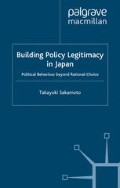Abstract
Politicians are averse to tax increases and have difficulty legislating them, unless they are assured of electoral safety. Tax increases are often visible and meet with opposition from various economic groups, as they directly affect the material well-being of those groups. Public opposition instigates politicians’ electoral concerns, and policy advocates have difficulty overriding their opposition. Arduous persuasion by skillful political leaders may convince individuals and groups of the need for tax increases. But even then, those constituents may not want to be the ones to bear the costs of tax increases and may disagree on how to actually distribute the costs.
Access this chapter
Tax calculation will be finalised at checkout
Purchases are for personal use only
Preview
Unable to display preview. Download preview PDF.
Author information
Authors and Affiliations
Copyright information
© 1999 Takayuki Sakamoto
About this chapter
Cite this chapter
Sakamoto, T. (1999). The Politics of Consumption Tax. In: Building Policy Legitimacy in Japan. Palgrave Macmillan, London. https://doi.org/10.1057/9780333982815_3
Download citation
DOI: https://doi.org/10.1057/9780333982815_3
Publisher Name: Palgrave Macmillan, London
Print ISBN: 978-1-349-41561-8
Online ISBN: 978-0-333-98281-5
eBook Packages: Palgrave Political & Intern. Studies CollectionPolitical Science and International Studies (R0)

